11 companies that have gotten the green light from MAS to offer crypto services in S’pore

With all the approvals that the Monetary Authority of Singapore (MAS) has been granting to companies dealing with cryptocurrencies, it can be difficult to keep track of which companies have been approved.
Some companies have been granted an In-Principle Approval (IPA), while others have been granted the Major Payments Institution (MPI) Licence.
This licence is granted under the Payment Services Act (PSA), which came into effect in January 2020. The PSA sets out a definition for cryptocurrencies, otherwise known as Digital Payment Tokens (DPTs), and mandates that companies acting as intermediaries dealing with these tokens require licensing.
Following the announcement of these new licensing laws, MAS has granted exemptions for some companies, allowing them to continue providing crypto services without a licence while MAS reviews their applications.
MAS also sets requirements for companies to apply for their MPI licence. Applicants must ensure that its management team has sufficient experience in operating a business in the payments services industry, as well has having sufficient capital buffers to account for profits and losses.
Companies must also fulfil audit requirements, comply with anti-money laundering requirements, and have a permanent place of business, with at least one appointed person to address queries or complaints from customers.
The checks by MAS may take several months, during which time the authorities do their due diligence and carefully examine each company. Upon finding the company satisfactory, MAS will issue an IPA, and work with the company towards achieving full compliance, upon which MAS will issue the full licence.
So far, more than 160 entities have applied for the MPI licence for DPT services, and only five companies have been granted the licence so far. Over 100 have also been rejected, and major exchanges such as Binance have also withdrawn their application.
Here’s a summary of the licences that MAS has granted, and what these companies do.
1. FOMO Pay

FOMO Pay received its IPA from MAS in August 2021, and its MPI licence in September 2021.
Founded in 2015, FOMO Pay is a fintech company that specialises in providing integrated payment solutions to merchants and retailers. One of its many achievements also include being part of the founding members of the SGQR taskforce to develop a common QR code standard for e-payments.
The company allows retailers to accept cryptocurrencies as payments. These cryptocurrencies include Bitcoin, Ethereum, USDT, and USDC.
Merchants who adopt the crypto payment solution will see a reduction in cost due to lower transaction fees compared to those from conventional fiat currency payment methods.
By receiving settlements in fiat currency, they will also not be exposed to forex fluctuations that could arise from receiving payment in crypto.
2. Independent Reserve

Independent Reserve is an Australian-founded cryptocurrency exchange, and holds the distinction of being the first foreign company to have been granted the MPI from MAS. The company had previously received its IPA in August 2021, and became fully licensed in September 2021.
The company was founded in 2013, and expanded to Singapore only in 2019. It allows customers to change their currencies from Singapore, Australian, United States, and New Zealand Dollars to cryptocurrencies and vice versa.
The cryptocurrencies offered by Independent Reserve include Bitcoin, Ethereum, XRP, and other major cryptocurrencies. As of September 2021, the company reported that it had over 200,000 customers.
Independent Reserve has also expressed interest in making Singapore its ASEAN headquarters, and has plans for regional expansion and partnerships.
3. DBS Vickers

As the brokerage arm of DBS Bank, Vickers obtained its IPA in September 2021, and its MPI in October 2021. The licence will allow DBS to support asset managers and companies to trade in cryptocurrencies through the DBS Digital Exchange.
Currently, Vickers allows customers to trade between four fiat currencies: SGD, USD, HKD, and JPY. For cryptocurrencies, Vickers also allows customers to trade Bitcoin, Ethereum, Bitcoin Cash, and XRP.
While DBS has generally been quite accepting of cryptocurrencies being introduced in Singapore, CEO Piyush Gupta has also previously stated that the bank will not be extending their cryptocurrency trading services to retail consumers in the near future.
4. TripleA

Triple A received their IPA in September 2021, and their MPI in November 2021.
Founded by serial fintech entrepreneur Eric Barbier, TripleA is a jack of all trades when it comes to the crypto space. He credited the company’s focus on its B2B business model, and their fulfilment of Know-Your-Customer obligations.
The company allows customers to trade cryptocurrencies, transfer money internationally, and also functions as a crypto payment gateway, allowing clients to accept payments in cryptocurrencies.
TripleA also partnered with Grab last October to enable cryptocurrency investments for TransCrypt (a TripleA brand) users, in which TransCrypt users will be able to buy cryptocurrency on TripleA through GrabPay.
5. Coinhako
Coinhako is the latest company on this list to have received its MPI in early May 2022.
Coinhako is a digital exchange that provides investors with a platform to buy and sell cryptocurrencies, and allows for the storage, transaction, and trading of cryptocurrencies.
Last year, the company reportedly oversaw trading of around S$7 billion, and a 522 per cent year-on-year growth in account openings. Coinhako is also looking towards regional expansion, after raising a new round of funding last year.
6. Hodlnaut

Founded in 2019, Hodlnaut allows customers to earn interest on their cryptocurrencies, by lending out cryptocurrencies to financial institutions and reliable decentralised protocols. The company received an IPA from MAS in March 2022.
Hodlnaut is currently looking to expand its business, allowing users to apply for loans and expanding crypto lending to retailers.
They will also allow users to deposit USD or SGD onto the platform, removing the need for users to convert fiat currencies to cryptocurrencies through a different exchange before depositing them in Hodlnaut.
7. Digital Treasures Center

Crypto payments startup Digital Treasures Center (DTC) received its IPA from MAS in March 2022
It helps clients take advantage of cryptocurrency transactions by allowing businesses to receive payments in cryptocurrency.
DTC founder El Lee believes that since traditional credit card companies charge high fees and have long settlement times, cryptocurrency payments are the future. DTC allows merchants to pay lower transaction fees and receive their funds in a timely manner.
In the short term, it is looking at expanding to markets like Dubai, Australia, and other countries in Southeast Asia.
8. Paxos
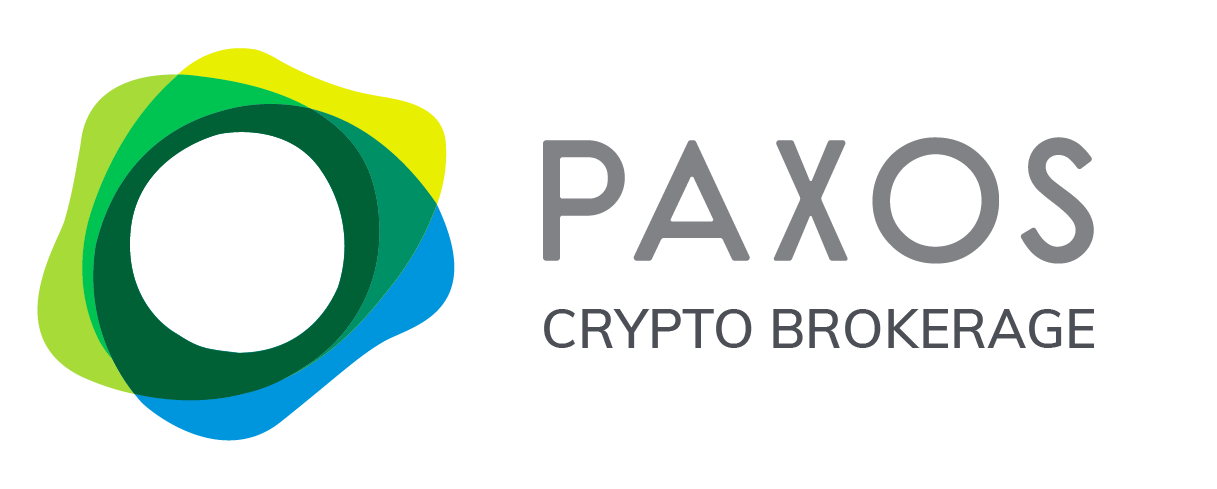
Paxos received its IPA in March 2022, and functions as a crypto brokerage and cryptocurrency custodian for clients. It also builds cryptocurrency and blockchain infrastructure for clients that wish to offer crypto products to their own customers.
Last month, the company raised US$500 million in funding at a valuation of US$2.4 billion, making it one of the fastest growing fintech startups in the world.
The company was launched in 2012, both in New York and in Singapore. As a crypto exchange, it supports Binance USD, Pax Dollar, and offers users PAX Gold, which is a token backed by physical gold held by Paxos.
9. Sygnum

Sygnum is a digital asset bank and digital asset specialist that’s based in Switzerland. The company has a Capital Markets Services Licence in Singapore, and was issued an IPA from MAS in March 2022.
Services offered by Sygnum include being able to deposit CHF (Swiss Franc), USD, EUR, and SGD to invest in cryptocurrencies such as Bitcoin, Ethereum, XRP, and Bitcoin Cash.
Additionally, Sygum offers white-listed DeFi pools and expanded staking services for profit, as well as asset management solutions and commercial partnerships with blockchain ecosystems for clients.
Earlier this year, the bank raised S$120 million in an oversubscribed Series B funding round, and brought the company’s valuation past S$1 billion. The funds will go towards developing the company’s Web 3.0 services.
10. Revolut

The company has held a MPI since October 2020, and received its IPA for digital payment token services in April 2022. With this, Revolut is now able to allow customers to convert between fiat currencies and cryptocurrencies.
Founded in 2015 in the UK, Revolut is today a global fintech firm offering customers the ability to deposit and change currencies through a digital wallet.
The company reported high growth over the pandemic period, with its customer base in Singapore having grown six-fold since the onset of the Covid-19 pandemic and its revenue run rate more than doubling over the past year.
11. Luno

Luno, which received an IPA in April 2022, is a cryptocurrency platform that allows customers to purchase and store cryptocurrencies, as well as invest in them.
The company was founded in 2013, and was acquired by the Digital Currency Group in 2020. Luno has garnered over 10 million customers across 40 countries and reported a 35 percent year on year growth of its customer base, and aims to bring cryptocurrency to over a billion customers by 2030.
S’pore’s strict crypto regulations upholds high standards
As Singapore dedicates itself to becoming the definitive cryptocurrency hub in Singapore, many fintech and crypto startup founders have also expressed approval for the strict regulations that the MAS has set for their licensees.
Companies that have already received their IPAs or MPIs also expressed similar sentiments, and pride themselves on having fulfilled the high standards set by the regulatory authority.
The order of the day for MAS remains ‘quality over quantity’, and as Managing Director of MAS Ravi Menon pointed out, “We don’t need 160 of them to set up shop here. Half of them can do so, but with very high standards, that I think is a better outcome.”
Featured Image Credit: Free Malaysia Today
Also Read: S’pore vs SEA: A look at the regional crypto landscape and the different regulations in place
This M’sian designs batik clothes that customers willingly wait up to 4 weeks to buy
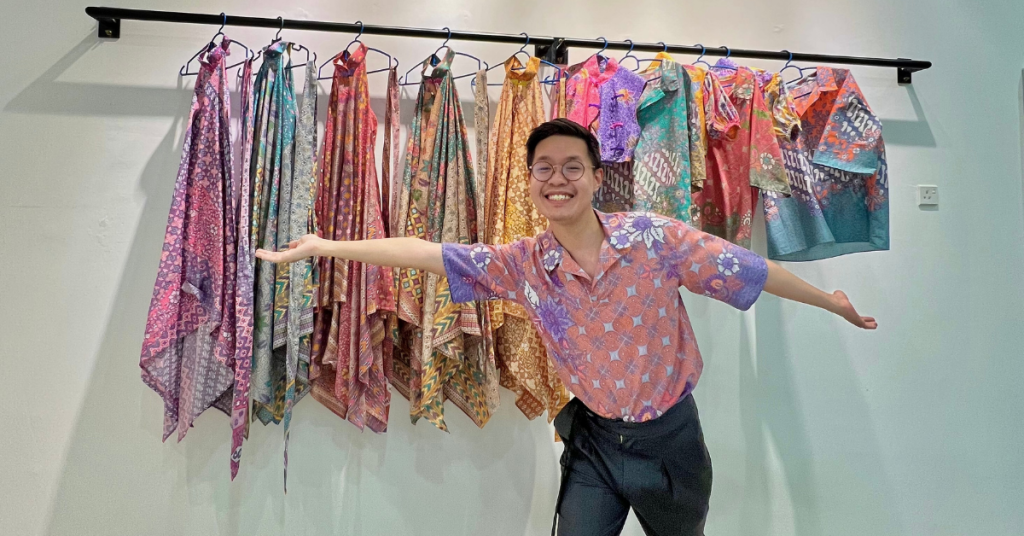
They say that discovering oneself is the key to realising one’s full potential. Growing up, Malaysian fashion designer Jeffery Goh struggled with finding his own identity. At an early age, he viewed himself as being different and was frequently bullied as a result.
Art was his means of expression. “Designing was an escape for me as I get to unleash my creativity and fantasies in my designs,” the artist said.
Now, he’s able to do that full-time after creating his own line of batik apparel called inisaya, which means ‘this is me’ in Malay.

Making a name for himself
After graduation, Jeffery set out on his journey to find his place in the world of fashion. Working with other fashion designers was his way of gaining the necessary industry exposure.
When he knew he had greater potential to start a business based on his creativity, Jeffery quit his day job to do so.
The aspiring designer thought he could create custom wedding and evening gowns. But when the pandemic struck, he realised it was not an ideal plan moving forward, considering how many weddings were indefinitely postponed following COVID-19 SOPs.
Instead, Jeffery saw his chance to challenge the menswear category for batik in Malaysia when he noticed that there was a severe lack of fashionable batik clothing for men on the market.
“Most batik clothing for men are just the plain shirts with normal buttons,” he noted, and thought to himself, “I would really like to introduce Malaysian culture in more fun, variant colours and modern styles or ways, but still not stray too far from the silhouettes and cutting of our traditional clothing.”
As clothing alterations became commonplace, Jeffery wanted to include them in his services too. Therefore, for a better fit, people who buy inisaya apparel can expect complimentary alterations and customisations.
Offering the greatest possible value
Jeffery explained that each piece of clothing is made by hand. “By placing the patterns in the most effective and pretty way to show off the prints, each batik piece we produce is special in its own way,” he affirmed.
To make the brand stand out even more, the designer stated that he only buys a certain amount of batik materials, and once the materials have been used up, they will not repurchase the same prints, regardless of how well they sell.
“We want to ensure exclusivity for our customers through producing less, and it helps the environment too,” he said. “We try to reduce waste by producing smaller batches, more exclusive and limited pieces so that each piece is unique, and also use the scraps to make pouches, bags and masks.”

Jeffery believes that every brand and every designer has a market. There must be some qualities that attract the right group of people.
For inisaya, the sizing of its garments is designed for men who prefer oversized clothing and for women who prefer clothing that can be adjusted.
“We are trying to make sure our clothes fit all of our customers, and by doing that, we think of different ways to make versatile clothes,” explained the designer. “We don’t only cater to one niche group, but rather we try to be more inclusive of all shapes and sizes.”
I myself adore the Wira top. The oversized aspect provides me with lots of room and mystery to my overall appearance. Not only does it hide most of my insecurities, but it also creates stylish silhouettes that differ based on what you pair it with or how you accessorise.

The team at inisaya now typically creates between 20 and 30 pieces of each design, and sometimes even less, pointing to their intention to create exclusivity.
A small but passionate team
The cost of running his business is not only monetary, but also time. “Most designs need about a few hours to draft, cut, and sew,” Jeffery revealed. “When I was doing it alone, I managed to make 50+ pieces within a week, and that is without getting enough sleep.”
Currently, the person helping Jeffery in yielding more fabric goods is his production assistant, Ain, who joined the team to learn how the fashion industry operates.
Meanwhile, Audrey, Jeffery’s assistant, assists him in managing the social media accounts and does the majority of the styling for the shoots.
Customers would typically have to pre-order their clothes two to four weeks in advance. However, the team caters to rush orders for an extra fee. Those orders will be prioritised before attending to other orders.
But even with such a lengthy process, Jeffery told Vulcan Post that there are still many people who actually understand that and appreciate the craftsmanship that goes into each piece.

inisaya’s main challenge lies with production, which is expected to increase in the near future. Finding more people to join the team is also crucial to the company’s growth and long-term viability.
“Making a piece takes time, especially when you’re using batik/prints in general, as some designs require you to match the prints for it to look nicer,” the creator expressed. “Also due to the overwhelming orders and demands, it is quite tough to make a lot with a limited amount of manpower and time.”
Customarily, the scarcity of a product would lead most business owners to raise the price as demand grows. However, an increase in price would be contrary to Jeffery’s core values, as he wants his garments to be accessible to as many people as possible.

Instead, he would focus on increasing the productivity of the startup. His strategy requires pre-cutting the fabric pieces and outsourcing them to home tailors, single mothers, and anyone else interested in taking up the offer. He firmly believes that by doing so, the economy would be provided with more opportunities.
Jeffery hopes to find freelancers to take on some of the remaining responsibilities of inisaya’s operations, including social media marketing, inventory, logistics, customer service, and accounting, and to learn from them at the same time.
Valuable lessons that couldn’t be bought
One of the most valuable lessons Jeffery learnt was the importance of putting his heart and soul into crafting his artistic creations. He believes that his customers can sense the passion he has for what he does.
The entrepreneur also learnt that there is no ideal time to start a business; rather, it is more important to be able to seize opportunities as they arise.
“When I launched my first collection, I didn’t think much about it. I also figured that there’s no harm in trying as I have got nothing to lose either. If it doesn’t work out, at least I know I have tried.” he theorised. “Surprisingly, [the collection] was well received. From this, I garnered more confidence to make more designs!”
And so, he did, launching a total of four collections in less than a year. For this and other accomplishments with inisaya, he gratefully thanked his parents, friends, and team.

In the future, we can expect to see inisaya’s first brick and mortar outlet. The designer hinted that he intends to develop his own prints, which will not be limited to batik themes, but will also include other Malaysian-inspired prints.
Jeffery’s story is one that shows the result of putting your passion into your work. When it culminates in a good end product, there will be customers willing to pay a fitting price and wait for it to be completed.
Also Read: 5 ways this crypto platform simplifies the investment process for beginners & pros
Featured Image Credit: inisaya
7-Eleven M’sia is playing catch-up to newer convenience store trends, how is it faring?
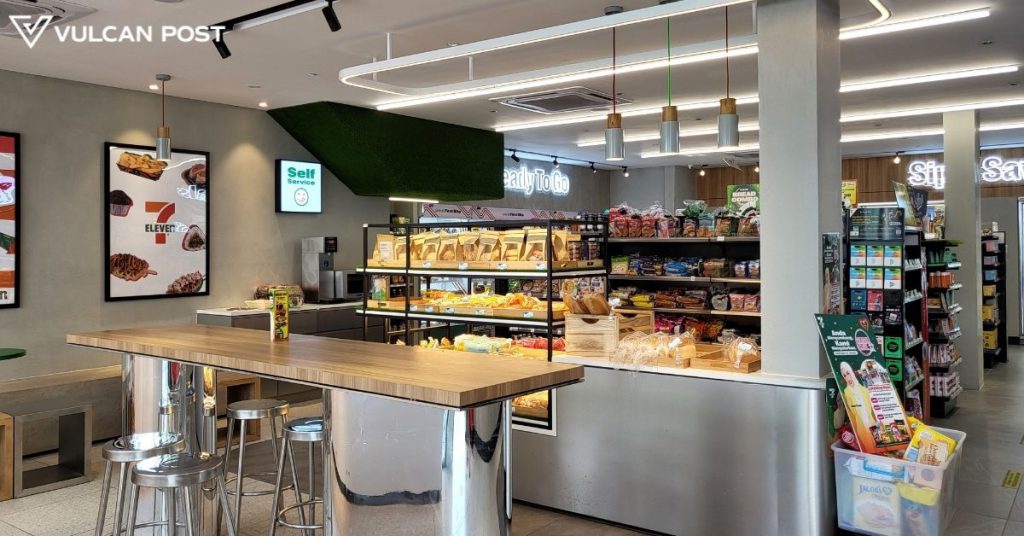
Convenience stores have gradually moved from stocking essential items to now offering a wide range of F&B items, including ready-to-eat meals to have within the premises’ eat-in areas.
Being a university student when Family Mart was new in the country, I recalled the excitement of my peers rushing to grab oden, onigiri, and sando as a quick snack in between lectures.
That was in 2016. Since then, homegrown convenience store brand MyNEWS also expanded to offer soft-serve ice cream and freshly brewed coffee in its stores.
It brought Korean convenience store CU into Malaysia in 2021 too. With ready-to-eat Korean snacks like bingsu, corndog, tteokbokki, Korean fried chicken, and more, the long queues seemed never-ending, even months after its launch.
In the same year, emart24, another Korean convenience store, joined the market. Its first outlet in Bangsar South even has a second floor, specifically for its eat-in area. The retail section is segmented downstairs, presumably to provide its diners with more privacy.

Despite possibly being one of the earlier international convenience store brands to reach Malaysian shores, it could be said that amidst all the attractive offerings of the above stores, 7-Eleven Malaysia seemed like it was becoming obsolete.
A few months ago though, it rolled out its own mini café in several stores across Klang Valley, fittingly named 7 Café.
It begs the question, is 7-Eleven Malaysia now playing catch-up to this newer convenience store trend?
A look at 7-Eleven’s growth in Malaysia
Originating in Dallas, Texas, 7-Eleven stores in Malaysia are wholly owned and operated by 7-Eleven Malaysia Holdings Berhad through its subsidiary, 7-Eleven Malaysia Sdn Bhd.
Incorporated locally in June 1984, 7-Eleven Malaysia claims to be the pioneer and largest 24-hour convenience store operator in Malaysia. Other than retailing snack products and basic necessities, 7-Eleven also offered bill payment services, pre-paid top-ups, Touch ‘n Go reloads, photocopying services, etc.

7-Eleven Malaysia launched its franchising programme after opening its 1,000th outlet in 2009 to offer existing profit-making stores to franchisees.
That same year, the brand introduced hot beverages along with pre-packaged frozen food, and a small bakery section for the convenience of customers looking for ready-to-eat snacks.
Now with 7 Café entering in 2022, the brand has expanded on its grab-and-go food options. Some additions you can find include freshly brewed coffee, affogato and soft-serve ice cream, chunky fries, and ready-to-eat meals including rice dishes, onigiri, and more.

Depending on the outlet, there are also dedicated eat-in areas so customers can have their meals without leaving the premises, for convenience.
Convenience store culture
The concept of such convenience stores isn’t new, especially in countries like Japan.
The land of the rising sun has perfected the idea of the convenience store, so much so that the Japanese word, konbini has taken on its own meaning.

A konbini is more than just a convenience store. It’s a place people have come to depend on in a world that grows ever more fast-paced, with the aim to offer something for everyone where you can buy snacks, ice cream and soft drinks, or even beer.
Though konbinis were originally catered to Japanese businessmen in its early days, younger consumers appear to be the largest crowd for convenience stores around the world.
On-demand culture seems to be the culprit, according to an article by Forbes. It proposed that millennials and Gen Zs have grown up with services that are available at the push of a button, anytime and anyplace.

My colleague fits into the target market. Frequenting emart24, she described the appeal of their hot meals as, “Korean food on a budget”. Since the made-to-order snacks are served in small portions, it gives her the ability to try the variety of their menu items in one sitting.
While she’s at it, she’s able to grab her groceries and browse through the skincare options on the shelves. It can be said that the same is made available by other convenience stores like CU and Family Mart.

Visiting a 7 Café branch in Uptown Damansara myself, it appears that the convenience store giant is matching up to its competition.
With a large table at the front of the store to dine in, you’ll be greeted by fully stocked shelves of bakery items, sandwiches, desserts, ready-to-go meals, along with made-to-order snacks and beverages at the counter.
Browsing through the assortment of grocery items in the store, you may even find more premium imported products like Oatly’s oat milk or Reese’s Puffs Cereal that are less common to find in local hypermarkets.

Having tried some of 7 Café’s food like its Spicy Cheesy Nachos, Mac & Cheese, Honey Mustard Sausage Croffle, and Mango Sticky Rice, a few of my colleagues and I decided that the food’s quality was good enough for revisits, especially for convenience’s sake.
Not to mention, the pricing of all items was within the expected range, such as loaded cheesy nachos for RM6.90, a honey mustard sausage croffle for also RM6.90, an affogato for RM5.90, and various coffees for about RM4.90-RM6.90.
Overall, we agreed they were pretty affordable for a quick meal.
Slightly late to the party
Overseas, 7-Eleven had already been making additions to its offerings that put it above regular convenience stores.
For example, in 2019, 7-Eleven opened a sit-down test store in Dallas, Texas, that offered upscale treats such as wine and beer on tap, kombucha, smoothies, and even an in-store taco restaurant.
Meanwhile, in Pattaya, Thailand, is a two-storey 7-Eleven with a convenience store downstairs and an in-house cafe serving all meals of the day upstairs.

So, back to the earlier question: is 7-Eleven Malaysia simply playing catch-up?
It does feel like it, considering how it’s taken a few years for its in-house cafe/sit-down concept to reach our shores despite the blueprints overseas.
To add, 7 Café comes after the other major convenience store brands have already proven the demand for such services in Malaysia.
That’s not to say that it won’t be able to measure up to the rest. From what we’ve seen, it’s already offering substantial ready-to-eat meals plus hot and iced drinks with variety.

Interestingly though, there’s no official webpage we can find on 7-Eleven’s site that lists out the specific outlets with 7 Cafés, so it almost feels as though the concept hasn’t been officially launched here.
Perhaps there’s more that 7-Eleven is planning for the concept before making it a core part of its identity here?
Ultimately, there is plenty of potential for the growth of 7 Café, and for the overall convenience store industry in Malaysia.
What it has is a good start, but it might need to find a niche that helps it stand out if we’re talking about maintaining brand relevance.
As of now, its offerings can be described as an ambiguous mix of western and Asian. Compare this to Family Mart’s strong Japanese identity, and CU and emart24’s Korean offerings, and you can see why someone would prefer these over the slightly more generic 7 Café offerings.
Once it’s figured out its niche, 7 Café can further enhance the customer experience by integrating more technology like self-serviced touchscreen kiosks for ordering and payment, among others.
Until then, we’ll be keeping an eye on how 7 Café continues to evolve.
Also Read: Affiliate marketing differs from influencer marketing, but how, and who is it fit for?
9 proudly M’sian-made shoe brands for ladies that offer alternatives to Clarks & Aldo
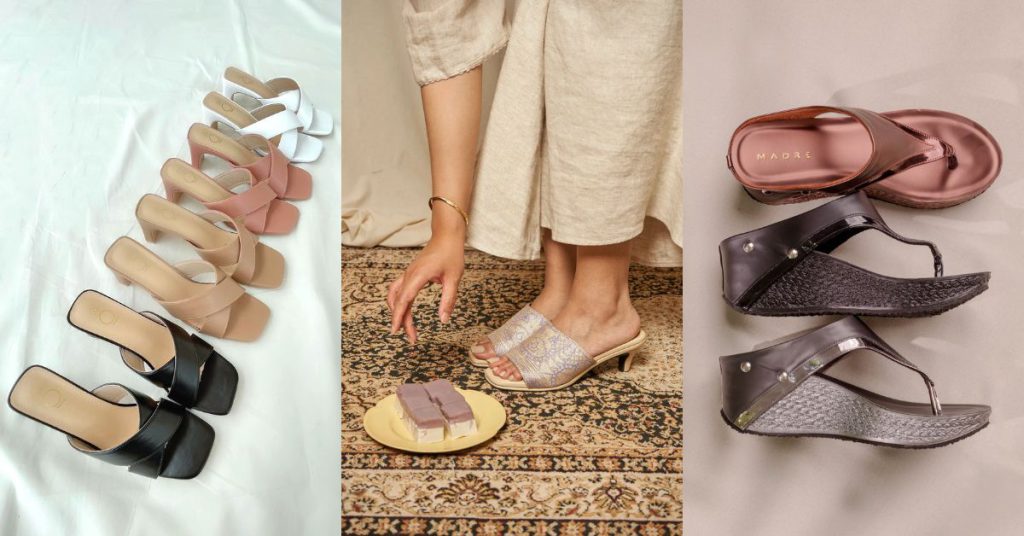
I haven’t really thought about it before, but it makes complete sense that the footwear industry was directly impacted by the pandemic. With people homebound, the need for a proper pair of shoes dropped.
But now as we’re frolicking back out into the world, our shoe cabinet needs an update too. Luckily for us, Malaysia is home to many homegrown shoe brands, and I’m not just talking about the ones from Jimmy Choo, Christy Ng, or Bonia. Here are some other local names in the shoe industry that offer a variety of styles and comfort for women.
1. My Ballerine

Featuring a more feminine and delicate style, My Ballerine carries flats, sandals, heels, sneakers, and more. The simple and classy designs have garnered the brand a sizable following online, and it has even collaborated with big names like Disney and Mattel to release unique collections.
Price: RM69.90 to RM129.90.
Delivery time: Orders are processed within three business days. Deliveries to major cities take two to four days, while other areas may need four to six days.
Where to buy: Website, Zalora, Shopee
2. Larrie

This Kuala Lumpur-based brand has been in the footwear business for over 40 years. Many shoes from Larrie feature soft, cushioned insoles for added comfort. From flats and sneakers to wedges and heels, Larrie covers a wide range of styles to suit various preferences.
Price: RM99 to RM159.
Delivery time: Three to five working days.
Where to buy: Website, Zalora, Shopee, Lazada
3. Amori

Established in 2002, Amori is a shoe label that proudly adopts current fashion trends while still catering to those who enjoy classic designs. Bolder products include boot sneakers (the ones that look like socks), though some classic casual pumps and sandals are also available.
Price: RM139 to RM419.
Delivery time: Three to five working days for West Malaysia, seven to ten days for East Malaysia.
Where to buy: Website, Parkson, Shopee
4. Qaysut

Qaysut is a line of shoes under the brand, Qaysaa, which focuses on clothing for modern Muslim women. The shoe collection is minimal and comes in an array of trendy shades such as mustard, dusty green, ash blue, and more.
Price: RM39 to RM79.
Delivery time: N/A.
Where to buy: Website
5. Machino

According to its website, Machino’s team spent 180 days of R&D to design the “most comfortable shoes possible”. Machino features many heels, which are known to be uncomfortable after prolonged wear, but the brand’s insole sponges supposedly help provide support.
Machino carries shoes that have unique Malaysian-inspired patterns as well as simple, everyday selections. Most of its shoes are made-to-order.
Price: RM118 to RM348.
Delivery time: 10 to 15 days.
6. Ijmal

Self-described as a brand for “comfort footwear for cool Hijabis”, Ijmal sells flat shoes and sandals in various earthy colours. According to Facebook, Ijmal’s shoes are crafted for prolonged walking and standing, so they should be pretty comfortable.
Price: RM129 to RM249.
Delivery time: N/A.
7. Madre

Madre, which means “mother” in Spanish, was founded in 2013 with an emphasis on stylish and comfortable shoes. The brand carries heels, wedges, flats, and sandals in a wide assortment of styles and colours.
Price: RM79 to RM189.
Delivery time: Three to seven working days.
8. Lyden

Originally a brand that traded and supplied shoes to local retailers and distributors, Lyden has since shifted to creating its own shoe brand. According to its website, Lyden believes all ladies deserve a pair of valuable black shoes, such as the ones from Lyden that feature cushioned insoles.
Price: RM29 to RM109.
Delivery time: Orders are processed within two to three business days. Estimated drop-off times are two to three business days.
9. Nelissa Hilman

Established in 2012, this proudly Malaysian label features stylish shoes that are handcrafted locally. Nelissa Hilman, the founder of the eponymous brand, was a chemical engineer before she decided to pursue shoemaking.
Nelissa Hilman features interesting colourways such as mauve, mint green, blush, latte, and other neutral yet interesting shades.
Price: RM198 to RM488.
Delivery time: Seven business days.
Where to buy: Website
- Read other articles we’ve written about Malaysian-based footwear here.
Also Read: 5 ways this crypto platform simplifies the investment process for beginners & pros
Featured Image Credit: Qaysaa / Machino / Madre
Ethereum founder uses Singapore as an example of how Terra Luna collapse should be handled

Vitalik Buterin certainly raised some eyebrows on Saturday, commenting on Twitter about how the Terra Luna disaster, which left many bankrupt and desperate, should be dealt with.
He shared an idea proposed by another user, stating that small holders of the failed cryptocurrency should receive compensation in the first place (assuming the reserves meant to protect the peg to the dollar were still intact).
Given that the vast majority of the currency was held by very large holders, thousands of small investors could be made whole entirely with this move, leaving the richest to bear the brunt of the collapse.
Buterin supported the idea by bringing up two examples — insurance of deposits held by banks (which protects savings of up to US$250,000 in the US) and Singapore’s Employment Act, which has stronger regulation of rest and work days for low-earners and manual labourers than it does for higher level managers and executives.
The notion behind it all is to offer greater protections to the smaller and weaker participants in the market, who do not necessarily have the power or financial means to weather such disasters (or write the rules themselves).
Is Vitalik Buterin supporting… regulation?
While it may sound generous and caring, it is also remarkably controversial in the crypto space because it clearly invokes something that all crypto supporters hate: centralised regulation.
The main promise of crypto was unbound freedom from the government, laws, legislation or any arbitrarily defined rules (though, as we know, the greater the freedom, the greater the responsibility required).

But now, one of the most influential figures in the entire industry is quite openly calling for differentiation of rules between smaller and larger currency holders, bringing up actual government regulation as an example.
While he did stop short of openly advocating for these rules to be made law, there’s no denying that is exactly where his train of thought leads.
Now, whether this could or should be enforced by external authorities on the entire industry, or just be devised as a part of each separate crypto project, is another question entirely. But the idea that freedom should have limits to protect millions of users is likely to cause a stir.
It also shows that in extraordinary cases, the human mind — even as devoutly engaged in crypto — leans towards establishing protections for some of the participants in the name of greater good.
It’s quite a funny moment, I have to say. We’re witnessing one of the leading crypto creators suddenly discovering why similar regulations have been put in place in traditional banking or in the case of Singapore, in employment, in the first place.
It turns out that the dream of absolute freedom is experiencing a hard landing in reality.

It seems to me that Vitalik may not have quite realised the consequences of what he was about to say, simply weighing in on the best way to solve the crisis that Terra Luna caused — and the immense suffering of thousands of small investors.
Many of them made quite irresponsible financial decisions that have now almost destroyed their lives (wiping out life savings, rendering them unable to pay their mortgages etc) though not necessarily their own fault.

Nevertheless, the risks of investing in any asset class are and should be known. It’s not without reason that the advice often goes to invest only as much as you are able to lose and diversify your portfolio to protect it.
The question, therefore, is — should the dream of unbridled crypto liberty be abandoned because so many people have overplayed their hand and have been pushed into bankruptcy or even onto the brink of suicide?
Are the ideals of what decentralised blockchain — that nobody should have regulatory power over — obsolete because of the volatility, risk and unpredictability of thousands of projects?
Vitalik Buterin certainly appears to think so, but will the community agree?
Shop and support the best homegrown brands on VP Label now:
[iframe_vp_product src="https://vulcanpost.com/label/embed-all/" id="iframe1"]
Featured Image Credit: about.me/vitalikbuterin
Also Read: End of a fad or sign of maturity? NFT sales collapse by 75.1% since September 2021
Foreign immigration has created 1,200+ senior roles in finance for S’poreans since 2016
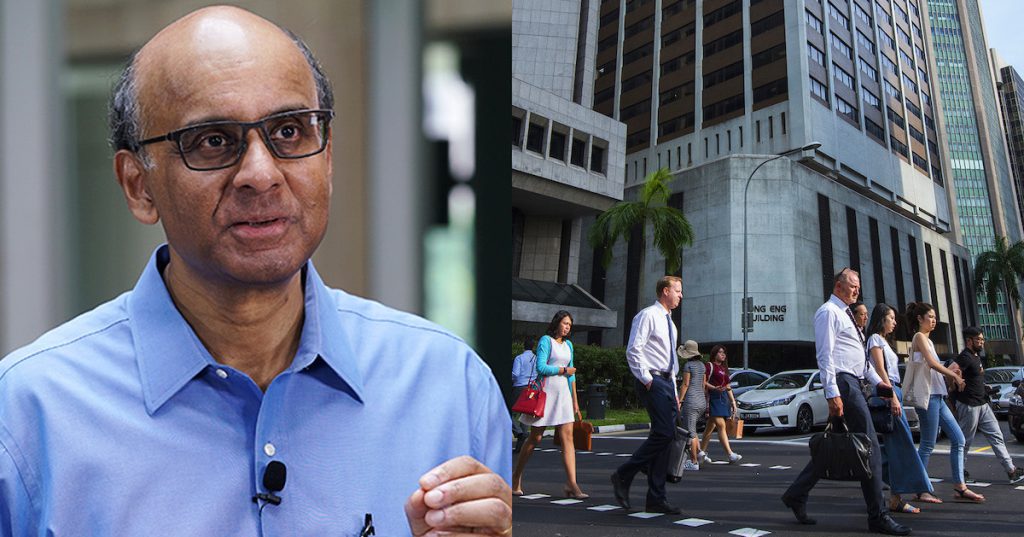
Disclaimer: Opinions expressed below belong solely to the author.
The number of Singaporeans in senior roles in finance has nearly doubled in the past six years to over 3,000 people — that was the answer Senior Minister Tharman Shanmugaratnam provided last week to MP Leong Mun Wai who asked about “the current percentage of Employment Pass holders, permanent residents and Singaporeans holding senior roles in the finance sector”.
You may have seen it in the news last week, as it was quite widely circulated. However, I believe there was one missing element in these reports — and that is how the sector grows as a whole, and the role non-Singaporeans play in it for the benefit of the locals.
This is a highly controversial topic for some, with many believing that foreigners are enjoying outsized benefits when they move to Singapore, taking up jobs that qualified locals could perform, hence relegating Singapore citizens to lower positions and pay.
Setting aside the fact that Singapore has historically been almost entirely populated by immigrants (who simply happened to have arrived in different periods of time), I think it’s important to underscore that foreign workforce — on all levels — is essential to the creation of jobs for current citizens.
Growing the pie
Let’s take another look at SM Tharman’s parliamentary reply, which was quite brief, but packed with information:
Answer by Mr Tharman Shanmugaratnam, Senior Minister and Minister in charge of the Monetary Authority of Singapore (MAS):
1. As at end-2021, about 71 per cent of the financial sector workforce were Singapore Citizens, 14 per cent were Permanent Residents (PRs), and 15 per cent were work pass holders. For senior roles1, based on MAS’ survey results for 2020, about 46 per cent were Singapore Citizens, 21 per cent PRs and 33 per cent work pass holders. These proportions have remained stable over the years, with a gradual increase in the proportion of Singapore Citizens holding senior roles in the finance sector.2. In absolute terms, more than 3,000 Singapore Citizens now hold senior positions in the financial sector, an increase of more than 80 per cent compared to 2016.
1 Senior financial professionals with more than 15 years of related work experience and undertake executive decisions in the company.
What does it tell us?
- Over 70 per cent of people employed in finance are citizens.
- 46 per cent of those in senior roles are citizens — so, fewer than foreigners, however…
- …in absolute terms, the number of Singaporeans in senior roles increased by over 80 per cent, to more than 3,000 people since 2016.
Finally, as these proportions are broadly the same over time, it means that the entire sector is growing. In essence, the pie is getting bigger — and everybody benefits from it.

If there are over 3,000 Singaporeans in senior roles in finance today, then in 2016, it was only around 1,600 to 1,700. With an increase of 80 per cent or more, that’s an additional 1,200 to 1,300+ positions for decision-making executives with 15+ years of experience.
At this point, it becomes a “glass is half full versus glass is half empty” debate as complainers will ask why only 46 per cent of these roles are filled by citizens, instead of looking at the fact that there are nearly twice as many of them in these positions today.
What it also shows us, however, is that foreign immigration is necessary for the creation of these and other jobs for Singaporeans.
According to the Association for Financial Professionals, 132 commercial banks — four local and 128 foreign — had presence in Singapore as of 2019.

That is in addition to dozens of other financial institutions, of which, only a handful are domestic. The vast majority of Singapore’s financial sector is under foreign ownership and control — and most of it runs international operations out of the city-state (rather than serving local clients), necessitating employment of foreign staff.
The fact that nearly half of all senior roles in these overwhelmingly foreign institutions are filled by Singaporeans should be a reason to celebrate, not complain.
It also shows that the more foreigners come to Singapore, the more jobs they create for locals — including those who are climbing the career ladder, or returning from abroad with relevant global experience to take senior positions.
Singapore itself is too small to be able to fill all vacancies (eg. in tech), and if there are no people to do the jobs needed on all levels in the company, there are no people to manage, and there will then be no need for managers and high-ranking executives — most of whom would be forced to move to wherever they can exercise responsibilities vested in them.
As long as the city-state allows these — and other — companies to seek out the best talent abroad, they will reciprocate by creating more jobs for locals too. Unlike what some like to claim, many of them are in positions of the highest responsibility and pay.
Featured Image Credit: MCI and Depositphotos
Also Read: From Great Resignation to Great Hiring: SAP and MOM data shows record job vacancies in S’pore